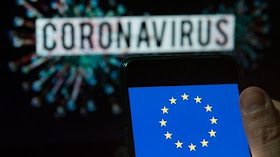 |
| pic: RTE News |
Each country took it upon itself to lay a roadmap and safeguard its citizens from the new virus. Some became a good example, others faced harsh criticism on their decisions, while the UK and Sweden were seen illogical and bold in their approach. The truth is, nobody really knows what they are doing and how could they; we have never seen anything like this in Europe before.
Soon enough though, apart from the unnecessary daily death counts and new cases updates, served by our media who are cashing in big time by our uncertainty and fear, another harsh reality became apparent; that of the economic crisis and disaster following the Covid-19 outbreak.
Many industries like that of tourism, aviation, hospitality and catering, as well as that of music and show business, realized that their future was bleak. People were told not to go out and socialize, travel or attend events. Shops and retail outlets were closed for months, some permanently.
If we had to be informed about the daily number of businesses closing or people losing their jobs, due to Covid-19, the impact of the outbreak would certainly feel more dramatic and bleak, at least mentally.
As result, the EU and all European governments realized that they had no option but to start re-opening the economy, since the pressure from businesses and industries, SMEs but also citizens themselves which felt the emotional and mental impact of the virus, was mounting.
Many countries that rely heavily on tourism, particularly those in south Europe, fearing the economic consequences of having to close their countries and suspend one of their major industries' function, pushed for a pan-European solution.
What followed next, became another embarrassing tug of war between north and south, the rich nations of the EU and those most affected like Italy and Spain. Understandably, the Mediterranean region not only had to close their borders and economy for 3 months, but they will also see very few tourists during the summer season due to the pandemic. This is a recipe for disaster, however their sentiments were not shared by their northern partners like the Netherlands.
The group of countries the latter has formed, the Frugal 4, insisted on loans that had to be repaid and not on grants to deal with the economic impact, citing the lack of responsible financial practices by the South. Of course, they conveniently do not admit to their citizens how they can get loans with lower rates by the markets, then lend at a higher rate to their EU partners and actually make a profit out of them, strengthening their economies further, to the detriment of their borrowers.
Eventually the EU Commission and the Franco-German leadership had to intervene and strike a balanced compromise and deal, which has been hailed a huge success and a way forward for the block. The Covid-19 Recovery Fund has been finally agreed by our leaders, awaiting approval by our parliaments.
The Commission also kept encouraging the block's member states, to maintain open borders between them, allowing trade and the free movement, in order to strengthen the economic recovery. After dealing with the financial consequences of the virus, it is time to work on the social ones.
However, there is little appetite for traveling this summer in Europe, after months of scaremongering, false reports and misinformation. In addition, many also face loss of income upon their return, if they have to self-isolate after traveling abroad with no reimbursement or paid leave arrangements in place.
Thus, holidaying in the EU still looks something only for the brave, those working from home or the ones that have no other option. And that is because we have created an open society, with no borders. Many of us work, live or study in a member state other than our own, with family back home, older parents that are often sick or other obligations.
How can Europe go on with closed borders or a crippled freedom of movement and for how long? Instead, it should finally decide to act collectively and uniformly plus get used to living with our new reality, while maintaining as much of our previous routine and living standards as possible.
Make face masks compulsory across the EU to allow travel. Enforce common social distancing practices across the block and decide how to deal with new outbreaks that will inevitably occur sporadically. Perhaps instead of closing off a whole country, we could only see localized lock downs.
The time of wild partying and clubbing holidays should now be suspended, as when people get dunk in cramped spaces it is undoubtedly a recipe for disaster. But that does not mean that more family styled holidays should be avoided, if the tourists keep the same practices in the country they are visiting as if they were back home; wearing masks, social distancing and respecting local practices like queuing and opening hours.
We should have the same chances of contracting Covid-19 at home or abroad within the EU, if we observe the same precautionary measures. Medical testing should become the norm at borders and in tourist hot spots. The existing EU Health Card should be put forward, to help dealing with new cases while holidaying in the block, just in any other ailment while traveling in the EU.
Covid-19 certainly poses new challenges and tests our abilities to cope and act in unity. But we should not allow it to divide us or retract to our national borders. Our strength is our freedom and openness, so if we were to alter they way we live for the long term, then we would not only be defeated by a virus; we would fail in proving to ourselves and to the world the purpose of the society we have created.
No comments:
Post a Comment
Note: Only a member of this blog may post a comment.